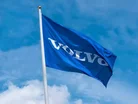Volvo: Trucks-to-trains swap slashes emissions in logistics

Volvo Car's trucks-to-trains swap will significantly cut its CO2 emissions in its logistic operations
Trucks still rule transport in Europe's logistic industry, but this is soon to change. Though cars are predominantly transported via trucks across the continent, Volvo Cars is currently challenging this process by swapping transport between its manufacturing plants and new car depots from trucks to trains. This is going to significantly slash CO2 emissions across the continent.
The implementation has already been met with success: swapping to rail transport has reduced CO2 emissions by as much as 75% on the route between its Ghent, Belgium-based manufacturing plant and a purpose-built depot in northern Italy. Another route that has been successful is from Ghent to Volvo Car's second depot in Austria, which cut emissions by 50%.
This initiative is borne out of Volvo Car's climate action plan that was revealed at the start of 2020. The action plan seeks to ensure that the manufacturer reduces its carbon footprint lifecycle per car by 40% between 2018 and 2025. This will require a 25% reduction across both its operation emissions as well as its logistics. This seven-year plan is a part of the company's greater goal of becoming carbon neutral by 2040. This is one of the most ambitious plans in the automotive industry, as it aligns itself closely with the Paris climate agreement of 2015, which aims to limit global warming to 1.5 degrees Celsius above pre-industrial levels.
Javier Varela, Senior Vice President of Manufacturing and Logistics at Volvo Cars, said: “When we said we planned to significantly reduce emissions across all our operations, we meant it. Our logistics network is just one piece of that puzzle, but an important one nevertheless. This is one example of our commitment to reducing our impact on the environment through meaningful, concrete steps.”
These operations are focused in Europe, but Volvo Cars has expressed its desire to expand this swap to its China and US operations. Its cars are already transported from its China-based manufacturing plants to the Ghent port in Belgium by train two times a week, and other train connections deliver cars to regional depots in China and Russia.
SEE ALSO:
Foundations have been laid in Volvo Cars' US operations as its Charleston, South Carolina-based manufacturing plant uses the region's well-established rail cargo network to transport new cars across North America. This replaces dozens of trucks each week, which will likely increase as the company begins the production of the next generation of its XC90.
Volvo Cars' ambitions are continuing to grow as it implements these initiatives. This swap comes shortly after the company recently launched its Recharge car line, which is the new brand name for all of Volvo's chargable cars. These cars will feature a fully electric and plug-in powertrain, encouraging plug-in hybrid drivers as it moves to boost the sales of its hybrid vehicles.
For more information on manufacturing topics - please take a look at the latest edition of Manufacturing Global.

